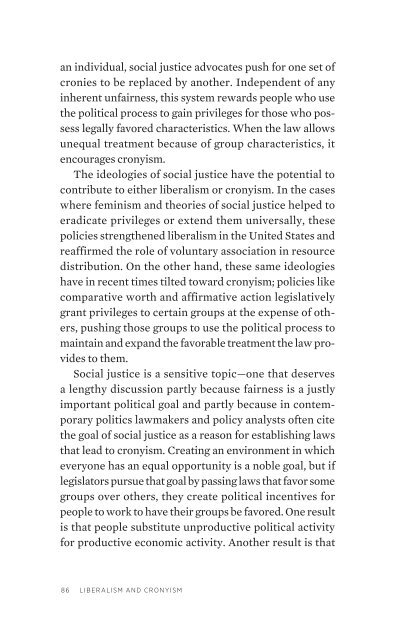url?sa=t&source=web&cd=1&ved=0CCYQFjAA&url=http://mercatus.org/sites/default/files/Holcombe_Cronyism_web
url?sa=t&source=web&cd=1&ved=0CCYQFjAA&url=http://mercatus.org/sites/default/files/Holcombe_Cronyism_web
url?sa=t&source=web&cd=1&ved=0CCYQFjAA&url=http://mercatus.org/sites/default/files/Holcombe_Cronyism_web
Create successful ePaper yourself
Turn your PDF publications into a flip-book with our unique Google optimized e-Paper software.
an individual, social justice advocates push for one set of<br />
cronies to be replaced by another. Independent of any<br />
inherent unfairness, this system rewards people who use<br />
the political process to gain privileges for those who possess<br />
legally favored characteristics. When the law allows<br />
unequal treatment because of group characteristics, it<br />
encourages cronyism.<br />
The ideologies of social justice have the potential to<br />
contribute to either liberalism or cronyism. In the cases<br />
where feminism and theories of social justice helped to<br />
eradicate privileges or extend them universally, these<br />
policies strengthened liberalism in the United States and<br />
reaffirmed the role of voluntary association in resource<br />
distribution. On the other hand, these same ideologies<br />
have in recent times tilted toward cronyism; policies like<br />
comparative worth and affirmative action legislatively<br />
grant privileges to certain groups at the expense of others,<br />
pushing those groups to use the political process to<br />
maintain and expand the favorable treatment the law provides<br />
to them.<br />
Social justice is a sensitive topic—one that deserves<br />
a lengthy discussion partly because fairness is a justly<br />
important political goal and partly because in contemporary<br />
politics lawmakers and policy analysts often cite<br />
the goal of social justice as a reason for establishing laws<br />
that lead to cronyism. Creating an environment in which<br />
everyone has an equal opportunity is a noble goal, but if<br />
legislators pursue that goal by passing laws that favor some<br />
groups over others, they create political incentives for<br />
people to work to have their groups be favored. One result<br />
is that people substitute unproductive political activity<br />
for productive economic activity. Another result is that<br />
86 LIBERALISM AND CRONYISM


